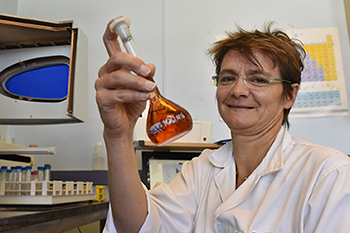Latest News Archive
Please select Category, Year, and then Month to display items
06 August 2021
|
Story Nonsindiso Qwabe
![]()

Every year, the Active Civic Teaching Office (ACT) at the University of the Free State runs the Big Give campaign to raise food, money to buy food, and other forms of assistance for needy students. This year is no different. ACT’s big project is raising money for sanitary pads for students on all three campuses. The project will run throughout Women’s Month, August 2021. Providing menstrual hygiene products to female students empower them to continue their studies in comfort.
Karen Scheepers, Assistant Director: Kovsie Support Services, said: “This year, one of the challenges that have been highlighted is the lack of sanitary wear for students. Therefore, we focus our Big Give campaign this year on addressing this challenge that students are experiencing.”
Be part of the Big Give campaign by donating sanitary pads or money towards this initiative. Donation boxes are ready for donations at all the entrance gates of all three campuses. Your donation will go a long way in helping a deserving student.
UFS Ground Studies Laboratory receives accreditation to international standard
2016-03-18

Lore-Mari Deysel, Deputy-Director of the institute for Groundwater Studies.
Photo: Charl Devenish |
The Institute for Groundwater Studies (IGS) Laboratory at the University of the Free State is on equal footing with international testing labs. With its accreditation in March 2016 by SANAS (South African National Accreditation System), the IGS Laboratory now officially meets global standards.
Quality of water
The IGS Laboratory mainly analyses the quality of water samples. When it was originally established in 1989, the lab’s central function was to conduct testing for researchers at the institute itself. “After the public and water boards realised their need to analyse water samples, the IGS Laboratory expanded to deliver a service to these clients,” says Lore-Mari Deysel, Deputy-Director of the institute.
Since suppliers and regulatory authorities will not accept test or calibration results from a lab that is not accredited, the IGS initiated the accreditation process.
Accreditation to international standard
In order to be deemed technically competent and able to receive accreditation, labs must meet the ISO/IEC 17025 standard. ISO/IEC 17025 was first issued in 1999 by the ISO (International Organization for Standardization) and the IEC (International Electrotechnical Commission).According to Deysel, this is the single most important standard for calibration and testing laboratories around the world.
“Laboratories that are accredited to this international standard have demonstrated that they are technically competent and able to produce precise and accurate test and/or calibration data. Furthermore, it demonstrates that the university has the capacity to supply valuable and reliable services alongside the academy,” Deysel says.